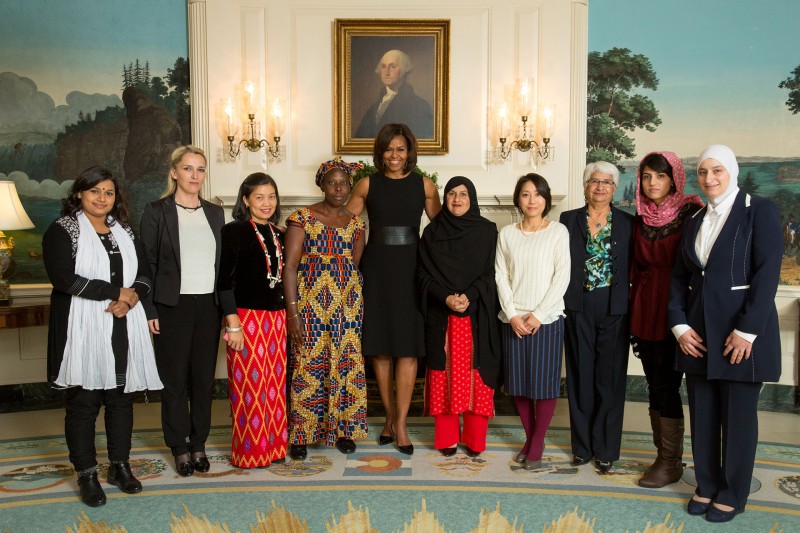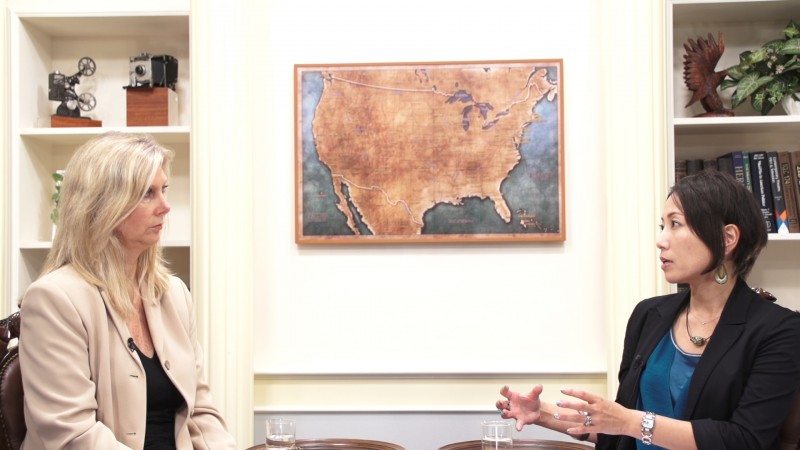
The U.S. Department of State presents “International Women of Courage” awards each year to women around the globe who have exemplified exceptional courage and leadership in advocating for human rights, women’s equality, and social progress. Past recipients include a woman in Mali who promoted women’s health rights and fought against gender-based violence during the terrorist occupation, and a police officer in Afghanistan who decided to pursue a career in law enforcement and devoted herself to drug enforcement despite death threats and physical abuse.
This year a Japanese woman was among the recipients of the International Women of Courage Awards for the first time ever. Award recipient Sayaka Osakabe was recognized for her efforts to eliminate maternity harassment, known as “matahara” in Japan. Maternity harassment is discrimination against women in the workplace based on pregnancy or the birth of a child. The discrimination can include psychological or physical harassment, dismissal or pressure to resign, and refusal to renew employment contracts. Based on Osakabe’s own experience of being harassed and pressured to resign from her job after she became pregnant, she founded Matahara Net, a group that helps women facing similar problems by providing them with information on dealing with pregnancy discrimination in the workplace. Osakabe is also working to raise awareness of the issue and promote legal compliance, diversity, and a reevaluation of the culture of working long hours.
Osakabe said Japanese media coverage of the International Women of Courage Award has helped raise awareness of maternity harassment and she hopes that this will help encourage change in Japan. Regarding her trip to the U.S. to attend the awards ceremony, Osakabe said: “The other recipients were from developing countries where they have to risk their lives to engage in their activities. Their courage inspired me to work harder.”
Like most working mothers, U.S. Embassy Minister-Counselor for Public Affairs Margot Carrington struggles to balance her roles as a parent and a professional. She has spent many years studying women’s advancement and has been heavily involved in efforts to improve work-life balance for employees at the U.S. Department of State. Carrington spent one year from 2010 to 2011 researching the best practices to promote women’s advancement by private companies, the U.S. military, and government organizations in the United States. She shared her findings in 2011, and made recommendations to the Department of State. She also shared her perspective in a 2010 American View article entitled “The Changing American Family.”
Osakabe and Carrington, who are both working to promote more female- and employee-friendly workplaces, exchanged views on how to address such issues as maternity harassment and work-life balance. The following are excerpts of their conversation:
Let’s be the first penguins!
Carrington: I want to start out by congratulating you for winning a 2015 U.S. Department of State Women of Courage Award. I’m curious to hear more about why you felt this was the time to speak out. I really think it took a great amount of bravery on your part for you to do that. Can you explain what brought you to this point?
Osakabe: The largest factor was Prime Minister Abe’s decision last year to make creating “a society in which women shine” one of his core policies. As a result, Japanese people began to acknowledge the need for women to continue working. Although matahara is both an old and new problem in Japan, this finally made it possible for women to speak out about it.
Carrington: I think the situation in Japan has changed in terms of the attention brought to this issue through Prime Minister Abe’s efforts and the efforts of many others, so we certainly welcome those developments. You talk about the need for women to leave the workforce in Japan still being an ongoing problem. Were you able to contrast that with the situation in the U.S. during your visit there?
Osakabe: The biggest contrast is that women’s right to work is firmly established in the U.S. The idea that “women’s issues are human rights issues” is not yet well established in Japan, so it needs to be disseminated further. In addition, because citizens’ movements are not very common in Japan, I felt that I should contribute to expanding citizen movements.
Carrington: I think that we are at the place we are in the U.S. because of women were like you – “the first penguin.” You’ve called yourself the first penguin, right? Were you able to meet with any women’s groups in the U.S. that might have given you some ideas?
Osakabe: I heard that groups in the U.S. that advocate for similar goals join forces with each other, which made me realize that Matahara Net also needs to work together with other groups. Since men are the key to solving women’s issues, I think we especially need to cooperate with groups that promote men’s participation in child rearing and work-life balance. I was reminded that men’s support is essential for establishing women’s rights and improving women’s status. In order for us to become a majority rather than a minority, we need to work together with groups that have similar goals.
Ideal working environments lead to economic benefits for companies
Carrington: I’ve also heard you talk about the different levels that are necessary –what the government can do, what employers can do, what people themselves can do. At the government level, could you tell me what you were able to see in the U.S. that was surprising or interesting to you, and how that might be applicable to Japan in terms of what the government can do?
Osakabe: This may not be at the government level, but I felt that the litigation culture is well established in the U.S. It is not only easier to initiate legal proceedings in the U.S. but there are also groups that play significant roles by providing arbitration services between employees and employers. This made me realize that we need such groups in Japan. Furthermore, the amount of monetary settlements is very small in Japan, and there is no legal penalty imposed on companies for wrongful dismissal. We need to change that.
Carrington: One of the examples that I’m thinking of—and I had the opportunity to spend a year in 2010 doing sabbatical studies where I actually looked at the issue of family-friendly companies—is a list compiled by an organization called “Working Mother,” where they rank companies on the basis of many factors. One of them is, “Are they creating an environment that’s friendly towards women?” which usually also corresponds to, “Are they friendly toward families and friendly toward men with families?” That’s been a very interesting way of focusing the attention on the economic benefits of that kind of approach. Employers who are highlighted in this way often become very sought after; people want to work in those companies that have a family friendly environment. Are you seeing any kinds of developments that are similar to that here in Japan?
Osakabe: In Japan, not many companies have started to actively promote the concept of “diversity,” under which companies honor and accept employees’ individual differences. The problem is that there is a huge gap between companies that promote diversity and those that don’t. According to the president of a Japanese company that promotes diversity, encouraging diverse work styles is not only beneficial in creating an ideal working environment for employees, but it is also a crucial part of business strategy because creating an ideal working environment attracts superior human resources and reduces employee turnover.
Carrington: Can we talk more about ways you’re raising awareness in Japan? I know you’re collecting a lot of data on matahara that I think is very helpful, and maybe you could share that with us.
Osakabe: On March 30, I published a “white paper on matahara” in which we gathered data on matahara for the first time in Japan. One of the most notable items of information in the report is that the practice of matahara is not related to company size. Out of the companies where harassment was reported, 19% of them are listed on the Tokyo Stock Exchange. Here’s a story I heard from a fourth-year female university student: In a meeting for applicants who had received tentative offers of employment at a company, an executive reportedly told the participants, “Ladies, please don’t get pregnant.” As seen in this example, whether a company practices matahara or promotes diversity depends on the attitudes of the company’s leaders.
Here’s another noteworthy piece of information: Looking at cases in which matahara occurred among coworkers, the number of cases in which female coworkers were the offenders was double the number of male coworkers. Matahara can occur regardless of rank and gender and anyone can be a victim. There were even cases that involved the human resources department, which is supposed to be responsible for preventing such behavior from occurring. Awareness of legal compliance remains low, so I believe the first step is raising awareness among corporations.
Carrington: What are your plans in terms of helping with training, or making organizations aware of systems that they can implement to try and address what is really an unconscious bias? People are not aware, even women, that they have this bias.
Osakabe: I would like to promote corporate training. Matahara Net’s strength lies in its collection of matahara victims and their cases. By providing corporations with training on inappropriate words and examples, I want to help them understand what kinds of words are hurtful to women. Understanding for pregnancy and childrearing hasn’t grown in Japan because the concept of division of labor based on gender roles developed during the period of rapid economic growth and is still deeply rooted in society. People harass women unintentionally when they make the innocent remark, “Why don’t you quit your job for the sake of your children?” When you get right down to it, the problem comes from a lack of communication. Better communication on a daily basis can reduce harassment. We also need to start educating children on this at school from a young age.

Women must continue working through this transitional period
Carrington: What would you like to say to young women to encourage them?
Osakabe: The issue of matahara is finally being recognized in Japan. Women in their 30s are now in a transitional period. I want them keep working and not give up. From now on, there will be more Japanese workers who don’t feel obligated to work long hours. In other words, the players of the game will change. When the players change, the rules naturally change as well, which will usher in a new era. Until that happens, I will continue to conduct activities to protect women. It is said that labor issues change when workers speak out. By all means, I want women to voice their discontent.
Carrington: It would be ideal to take the best aspects of what you have in Japan, which is in some cases much better maternity policies and better access to child care, and in the U.S., which is much more of an acceptance of women working and continuing to work. I think maybe that’s the best ideal we could have moving forward, to figure out how we could have a really robust discussion of U.S. and Japanese women figuring out together the best elements of both of the systems.






COMMENTS1
Thanks for sharing this post! Keep it up.
LEAVE A COMMENT
TOP